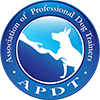Making a Living With the Dogs – by Veronica Boutelle, MA, CTC
Ever wish you could quit your day job and live life with the dogs? Perhaps you sit at your work desk dreaming of being a dog walker? Maybe you drift off during meetings, imagining yourself training canines? Or stare past customers, planning your own doggie daycare? In short, do you want to work with dogs full time, but can’t see how? Coaching and supporting dog professionals for a living, I’ve seen people make the transition to full-time dog pro from all walks of life—lawyers, secretaries, computer scientists, sales reps, consultants, college students, you name it. So if you’ve ever daydreamed, read on to see what it takes to make a living with the dogs.
Seek Good Education
There’s a lot of skill and knowledge involved in training, walking, and caring for others’ animals. If you are serious about being a professional, it is not enough to hang a shingle—you owe it to yourself and the dogs to pursue good quality education. Would-be trainers, there are several schools to choose from, with a wide array of geographical location, cost, and time commitment. Among the most highly regarded are Terry Ryan’s Legacy programs in Washingston state and Pat Miller’s Peaceable Paws programs in Maryland. For those interested in dog walking, the only training and certification program is the dogTEC Dog Walking Academy (dogtec.org), with locations on both coasts, including Seattle. Pet sitters, check out the National Association of Professional Pet Sitters (petsitters.org) site for educational opportunities.
Hatch a Plan
To give yourself the best possible chance of success you need a comprehensive business plan. It doesn’t have to be fancy or formal as long as it helps you assess viability and provides guidance as you move forward. Your plan should include goals for the business, a numbers assessment, a marketing plan—your niche and message, image, services, materials, and how you will get the word out—and an overall checklist of tasks and due dates.
Assess Your Skills
When you run a small business you have to oversee everything. You may be great with dogs but are you ready to be a bookkeeper, accountant, marketing manager, secretary, and office manager? A key to successful full-time business ownership is to recognize your weaknesses and subcontract tasks that confound you or that require expertise you don’t possess.
Establish a Schedule
One pitfall of self-employment is the lack of a routine. If a flexible schedule without a boss and specific deadlines makes you feel rudderless, working for yourself can be a challenge. It’s easy to do little or nothing when you have unlimited time. I’ve seen dog pros struggle for months to do what could have been done in weeks or even days. To keep yourself working toward your goals without losing focus, make a realistic schedule and commit to deadlines. Avoid wasting time by structuring your workdays carefully. What times will you see clients or work with dogs? When will you take care of administrative tasks? When will you spend time growing your business?
Know the Regulations
All business owners must have a business license from the city in which they are located. You may also need a fictitious business name from your county. Dog walkers, be sure to check with the local parks department and your city about any permit requirements and about legal limits for the number of dogs you can have with you at one time. But don’t let official requirements put you off—they’re not difficult to comply with and once they’re out of the way you’re legally free to go enjoy yourself.
Protect Yourself
Because dogs are animals and animals sometimes bite, put some basic protections in place to safeguard your personal assets from liability. Always use a contract with every client that spells out what your responsibilities are and are not, and that contains legal waiver language. Obtain professional insurance—it’s cheap and easy to get through a membership to professional organizations like NAPPS for sitters or walkers or the Association of Pet Dog Trainers (apdt.com) for trainers. You might also consider being a limited liability company, a relatively simple way to legally separate your personal and business assets.
Go For It!
Being your own boss can be challenging, but the rewards of a flexible schedule full of dogs are well worth the time and effort of starting your own professional dog business. So don’t be intimidated—seek support and get started. Other dog lovers are doing it. You can too.
How To Get Started
Dog Walking Schools
dogTEC Dog Walking Academy
Various locations – Coming to Phoenix May 7-10…contact AZ Dog Sports 602-237-6775
Dog Training Schools available:
Coaching People to Train Their Dogs with Terry Ryan
Sequim, WA
Peaceable Paws Dog Trainer Apprentice and Intern Programs with Pat Miller
Hagerstown, MD
Karen Pryor Academy
Various locations nationwide
Animal Behavior College
Online program with local mentorships
Veronica Boutelle, MA, CTC, helps would-be and established dog pros start, run, and grow successful businesses. She is also the author of How to Run a Dog Business: Putting Your Career Where Your Heart Is, available from Dogwise (www.dogwise.com). To learn more, visit www.dogtec.org.



